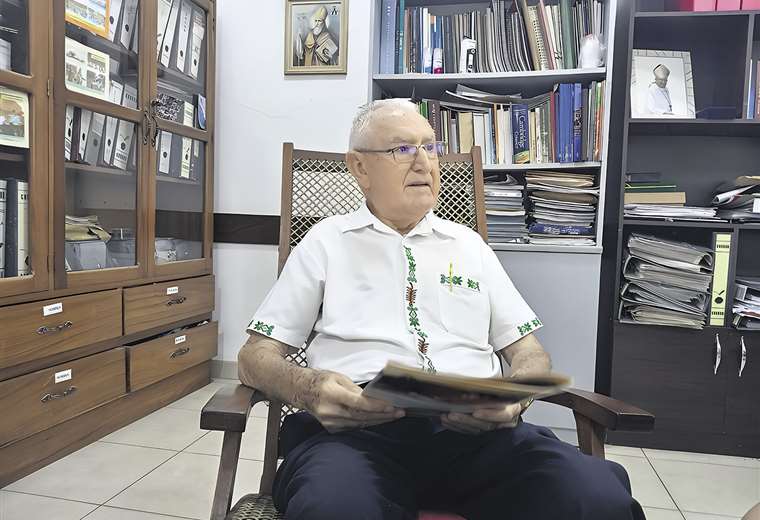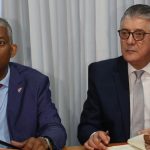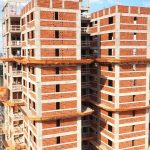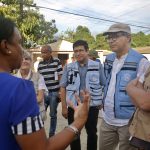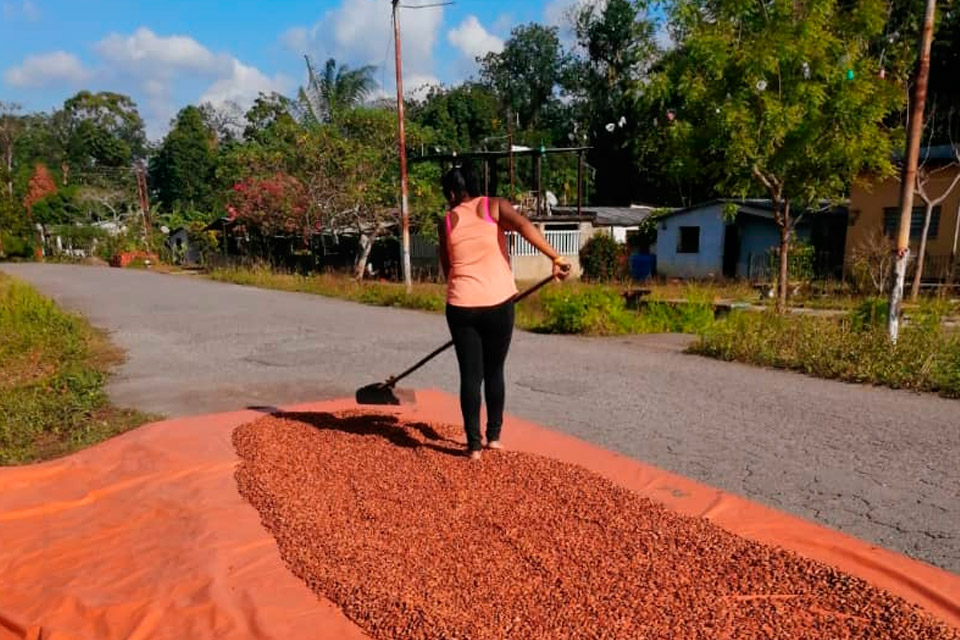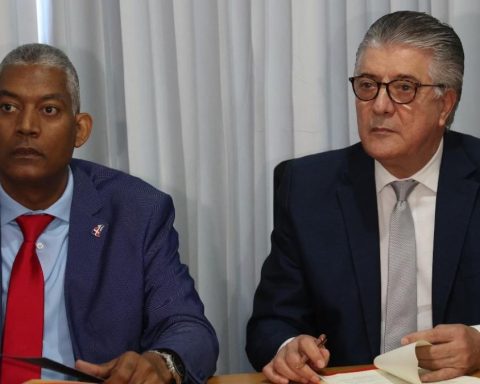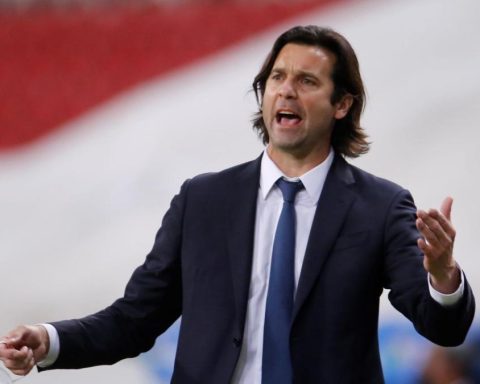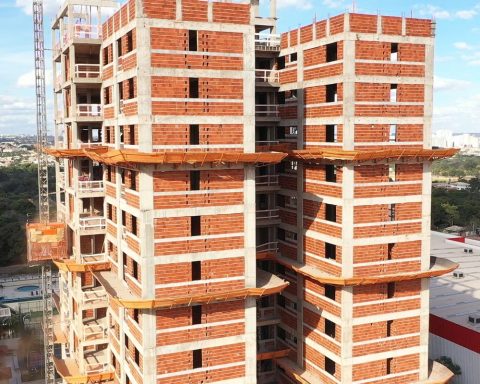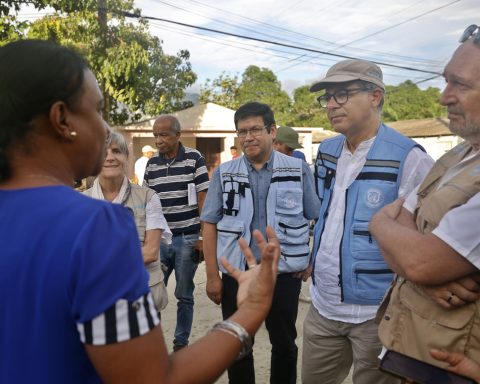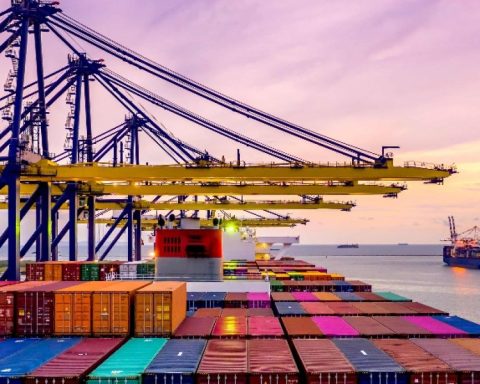December 22, 2024, 4:02 AM
December 22, 2024, 4:02 AM
Monsignor Nicolás Castellanos arrived at Plan Tres Mil 33 years ago and created the Hombres Nuevos project that continues to help those most in need to this day. It channels support to social projects and also in areas of health and education.
He opened the doors of his home in the Andrés Ibáñez citadel, which he has seen grow in more than three decades and from where he also lives and feels what all Bolivians go through. It talks about the needs of the population, the work that the authorities and those who aspire to reach the Government must face.
How has Hombres Nuevos been able to reach so many impoverished areas of the country?
We arrived in Bolivia 33 years ago, but the foundation was founded in 1999, seven years later.
We came with a very open spirit: we must respond to the real and felt needs of the people. For example, I was not planning to build churches, but when we went through the neighborhoods we held small assemblies with people and when we made the diagnosis the first, second and third need were temples. And that’s because first there is the need to be right with God and then come the schools and hospitals. We have built 23 churches, always at the request of the people, 121 schools throughout the country. We have just done the last one now in the Tres Mil Plan, behind the City of Joy.
One of the last things we have done are water reservoirs for irrigation, this in the Gran Chaco, in Caraparí, where we made 14. The people were desperate and progress and prosperity have come, because without water they could not maintain production.
-What has changed since you arrived at Plan Tres Mil?
It has changed substantially, when we arrived, a legion of shoe shine children came out every day, that has disappeared. In the afternoons, especially the girls went out to sell the bread their grandmothers made, none of them go out anymore either. There has been a change from the inhabitants who were 75,000 and now there are 500,000. I share an anecdote that shows a little of the history of the Three Thousand Plan, a person suffered a heart attack and had about an hour to live, but there were no taxis or paved streets, the transfer by wheelbarrow to the hospital took an hour and a half, so I didn’t resist. Those are dramatic cases that I have experienced.
When we came 33 years ago, boys and girls in Plan Tres Mil were dying of hunger. Terrible that, in 1992, that situation happened. When I was on the street the children hugged me and said: Father, I’m hungry. You gave them a fifth and they went to buy bread. It was common to see children on the streets under a light doing their schoolwork and when you asked them why they were there, they responded: my dad hasn’t paid for the electricity and they have cut it off. This whole situation has disappeared.
-The country is in crisis, what are the greatest anguish of the population that you see on a daily basis?
There is a contrast. The terrible, overwhelming crisis that the country is suffering everywhere, and this year we have achieved 23 projects. When there is a crisis, it is a matter of organizing well, this country is rich, we are the lithium reservoir, there is no right for us to be in the misery we are in.
Our incompetent, incapable and abusive rulers are to blame, because what they are stealing more than serving, that must be said clearly.
-What should leaders do to reach the population that does not have food or public transportation?
First of all, we must overcome corruption, because here it is part of the culture to be corrupt, that is evil. I remember when Evo came out we all said good, because he had said zero corruption, but it has been the most corrupt Government that has ever existed in Bolivia. That’s not possible. The rulers must seek the common good of the people, but they only seek to enrich themselves, to steal the money of the poor people of the country.
It must be said clearly, we have all this because people trust us. Now we have finished the last school, an infrastructure that if built by the Government or the municipality is worth a million (dollars), but if we build it it costs 300,000 dollars, that is the difference.
-After the economic boom that Bolivia had, do you think that the quality of life of the poorest has improved, compared to when you arrived in the country?
Yes it improved, we must admit. I have been here for 33 years, the quality of life of the people is better than 20 or 30 years ago, but it would have to be much better if there were less corruption.
-What should be done to improve people’s quality of life?
We are clear about it, education. We have built 123 schools and we have 18 agreement schools, we are giving quality to education because a country changes the day education changes, a country that does not invest in education does not invest in social development.
We have programs to improve the training of parents and teachers, in order to have well-educated, well-trained citizens who seek the good of all.
-What are the main problems of the country, from your perspective?
There is a distressing economic problem, we do not know how this will end, so that is worrying. Another important problem is the constant strikes and blockades, because this paralyzes the life and development of the country. Corruption is another cancer that invades the country, which prevents development, making us a rich country one of the poorest countries in the world.
In Latin America, after Haiti, Bolivia is the poorest country. Here everything is fixed by stopping.
-If we leave politicians aside, what should the population transform?
We would have to become aware, first of all, to elect politicians, so that they are not corrupt. Then, civic training is essential. For example, given this situation that we are experiencing, civil society would have to react. In any country in the world that there is no diesel, no gasoline, no oil and no rice, there would have already been a change of government. Here we are living in misery and people are too passive, civil society should become aware that we must demand from the rulers another progressive, modern Bolivia, with freedoms and not be with this Bolivia of dictatorships, political prisoners, etc. .
-How to awaken that civic consciousness?
It is a long-term job, fundamentally the change has to come from the school, where free, responsible and supportive citizens must be formed, because they would be the ones to make the change. For example, in China they have 14 hours of classes a day, while here we have three and a half hours. Those Asian countries have changed, because education, school, has changed.
We have an educational system from the 19th century, teachers from the 20th century and students from the 21st century. If there is one interesting thing that must be highlighted, which I always highlight when I go to Europe, it is that in the north there are all the means to live and it is said to be the welfare society; And in the south we lack almost all the means, but we have plenty of reasons to live, because here people dance, they are happy, they are festive. The Bolivian people have great values, they are the most community-oriented, supportive, they like to share, have joy and have a sense of celebration.
-We are close to a national election, what should the candidates incorporate into their government plans?
The first thing we must ask of politicians is that they get out of this culture of corruption, that they are not politicians to steal, to benefit, but to serve the people, starting with the most vulnerable, that would be the most fundamental thing. I think that in Bolivia smuggling, extortion, and corruption prevent people from living well, being a rich country. We have all the possibilities, in lithium we are the reservoir country in the world, which is used in computing and everything digital.
Hombres Nuevos has shown that another Bolivia is possible: a democratic Bolivia, of freedoms and, if we used resources to help the people and solve problems, we would not be the poor country that we are.
-How do you think the way out of the economic crisis should be approached, thinking about social equity?
I believe that the rich, those who have the means, should apply social responsibility. There are businessmen who apply it, who solve it, but it would have to be more generalized. I think entrepreneurs should be encouraged and encouraged, because the country needs to create jobs. A serious problem we have is that 82 percent of work is informal, which does not pay taxes and consequently education, health and roads are fatal. A businessman from Santa Cruz told me that he only pays 18 percent taxes in Bolivia, so he cannot sustain himself.
-How should politicians deal with this crisis?
They would have to study the issue and see a way out of the situation where we are. Now we are on the eve of the elections, everyone is promising to get out of the crisis, but they come to power and do not provide sufficient resources, starting with suppressing all corruption and all smuggling, because all of this impoverishes the country.
-What do you dream for Bolivia, for Santa Cruz?
Santa Cruz is a region of great prosperity, it offers a lot to the nation. At this moment we are in a dilemma, we do not know how all this is going to end, will we end up in the poverty of Venezuela, Nicaragua, Cuba? There has never been a situation so black, so negative, as the one we have now. Let’s hope that there is a change of government and that the next rulers take the crisis seriously and apply the appropriate measures to get out of the crisis, because being a rich country there is no right for there to be so much poverty.
– What would be the ideal Holy Cross for you?
A Santa Cruz where we overcome inequalities. Bolivia’s biggest problem is that it is the country with the greatest inequality in Latin America, so the important thing would be for there to be a better distribution of wealth, to create jobs, we must overcome that 82 percent of informal work, many are businesses in the streets that do not pay taxes, then we would have to overcome all those scourges that our society has. All this would be done by governments that have the political will to serve the people, not serve the corrupt and seek social justice above all.
-What message do you leave the country this Christmas?
Despite the crisis in which we live, as human beings and as believers we must never lose hope, we all have to lend a hand, that the problems that the country has are not only those of politicians, but also of civil society, We all have to pitch in to solve them. For example, one of our biggest investments this Christmas is to give Christmas Eve dinner to the Palmasola tuberculosis ward; To the 650 women in Palmasola, on Christmas and New Year’s Day, we give them a chocolate and some panettone. The older adults in the prison have written to us that they needed 30 mattresses, we have spent Bs 8,000 to buy them. We have given four psychiatric patients a bonus of Bs 10,000 each, we can all do these small gestures that Hombres Nuevos does and in this way we could reduce the borders of poverty.
So, a message of solidarity: poor Jesus is born so that we can all be rich, we can all live well and we can all be happy.
Let’s not forget, we are happy to the extent that we make others happy.
